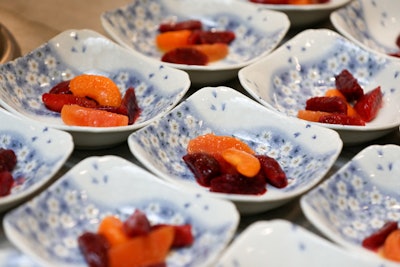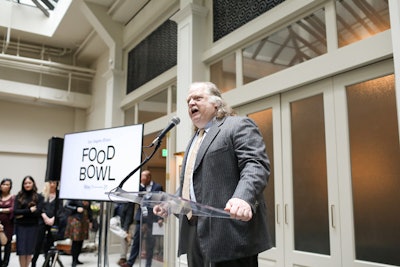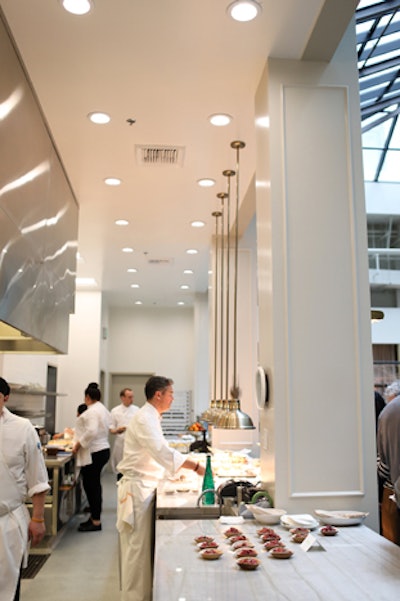Earlier this month, the Los Angeles Times announced the launch of a buzzy new food festival: Food Bowl is a month-long festival bowing in May, slated as a new annual event on the ever-changing landscape of Los Angeles culinary events. The idea for the fest is to celebrate the city’s diverse and increasingly more influential food scene, and it will combine dining experiences with raising social awareness about food waste and hunger. The Times is billing the new program as the city’s largest culinary event to date.
It will include programs with big-name international chefs making rare U.S. appearances, including Massimo Bottura, chef-owner of Osteria Francescana in Modena, Italy, and founder of Food for Soul; Fergus Henderson, chef and founder of St. John in London; Rosio Sánchez, chef-owner of Hija de Sánchez in Copenhagen; and Magnus Nilsson, chef at Fäviken in Sweden, with more to be announced. Times food critic Jonathan Gold, editor Amy Scattergood, deputy editor Jenn Harris, and Test Kitchen director Noelle Carter will curate and host events during the program.
The centerpiece of Food Bowl will be the bustling outdoor dining experience known as Night Market, held at Grand Park. Inspired by the global street food scene, Night Market will include 50 restaurants and food trucks, drinks, and live entertainment each evening from May 10 through 14. In all, the Food Bowl schedule will include hundreds of events throughout the month, including over the Memorial Day holiday weekend.
Los Angeles Times vice president of public affairs and events Suzy Jack said that the new fest would not replace the annual Labor Day food festival, known as The Taste, but rather it would add to the roster of food events the newspaper hosts annually.
“Food Bowl is a new addition to our series of food and beverage events throughout the year, and a very different type of event than the others we currently host,” she said. “In addition to Food Bowl in May, we’ll be holding The Taste over Labor Day weekend and a celebration of Jonathan Gold’s 101 Best Restaurants in the fall. We are constantly looking for new ways to engage our readers and new audiences through the subjects we cover, and food and dining is a natural given the dynamic food scene in Los Angeles and our amazing team who covers it.”
She said the Times’ presence on the food scene is both deeply established and also ever more important in the city—for both the paper’s bottom line, and also for community development in a larger sense.
“The L.A. food scene is quite unique. L.A. is one of the most diverse cities in the world. There is a stunning variety of cuisines represented here, and dining and cooking is a significant way in which we understand our community. If you read one of Jonathan [Gold]’s reviews, you’re just as likely to learn something new about Chinese culture as you are about which dumpling you should order,” she said. “It’s important for us to translate this exceptional coverage into events for a few reasons: We are committed to bringing our journalism to people in a variety of formats. Live events is an ideal format for food when you can, for example, hear Michael Cimarusti talk about why sustainable seafood is important, see how he prepares a simple dish with sardines, and ask him where to get the fennel fronds. The L.A. Times has a large audience, but we need to continually connect and have conversations with our existing audience, as well as reach new people. An event is sometimes the first contact we have with someone who later becomes a subscriber. And events are a big way in which we build relationships with the community.”
She added that live events help support journalism at large, especially important given a challenging political climate for media. “Events also create opportunities for us to work with clients to help them connect with our audience and the community,” she said. “And at the end of the day, events help fund the quality journalism that the Los Angeles Times has provided for the past 135 years.”
Jack said that the month-long, city-wide format makes for a way to engage with more people than a smaller, ticketed fest. “Our goal is to engage the whole city with the joy of a good conversation over a great meal. We will have several events that will be free and open to the public,” she said. “There will also be some more intimate and exclusive events, with a higher ticket price, and portions of the proceeds from a variety of events throughout the month will go towards programs that fight hunger and food waste.”
Jack explained that the new festival stands out from others on the crowded food event calendar in L.A in part because of its ambitious scope. “Food Bowl stands out because it will be held over the full month of May and we’re planning for hundreds of events. We see it as a new kind of food festival for L.A., capturing the local food scene as it is now and helping to shape what it will become.”
The strong themes supporting food access, sustainability, and waste reduction also set the new fest apart. It will raise money and make direct donations to programs and initiatives that provide access to food and nutrition for those who cannot afford it.






















